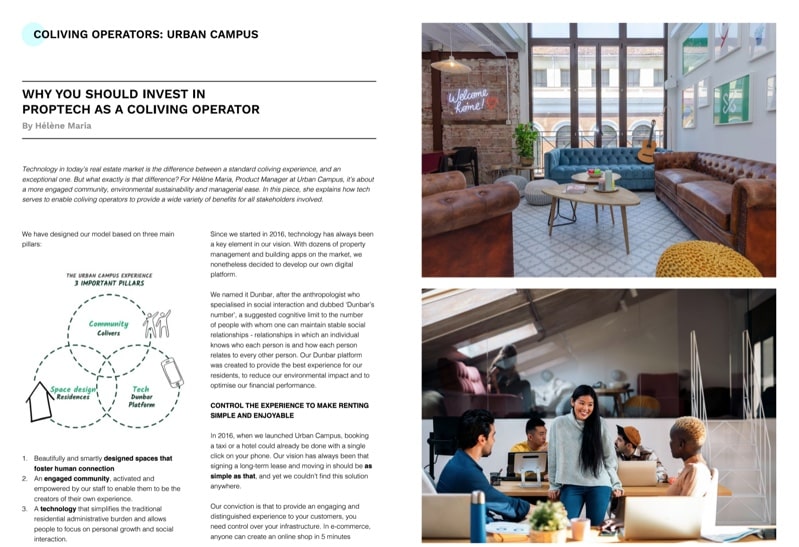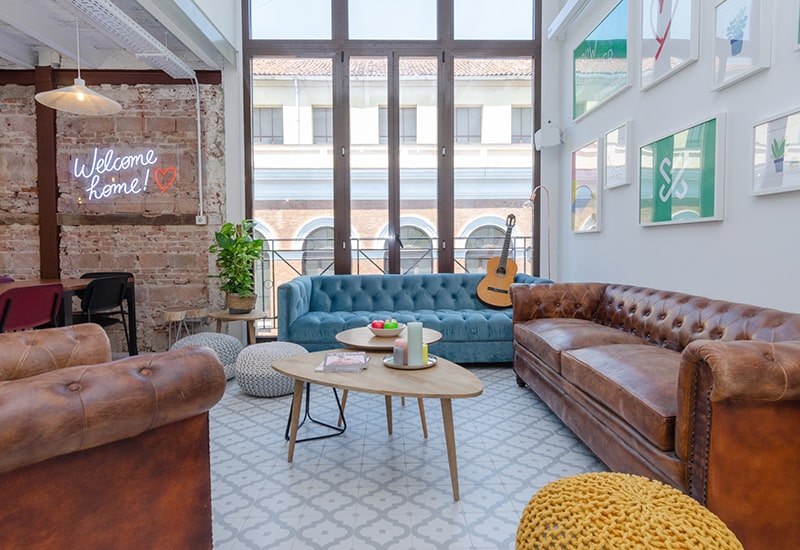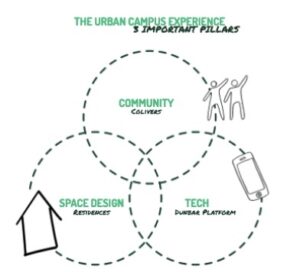Press Release: Urban Campus raises €7M From Nexity and Batipart to accelerate its development
- Urban Campus designs and manages coliving and multifamily residences in Europe on behalf of institutional investors.
- The company announces that it completed a €7M funding round with Nexity and Batipart to expand into new markets.
Paris 8 April 2021,
Urban Campus, which designs and manages coliving and multifamily residences in Europe on behalf of institutional investors, announces that it completed a €7M funding round with Nexity and Batipart to accelerate its development.
Urban Campus manages 2 residences in Madrid and has a robust pipeline of more than 30 projects in key European cities. The company developed its proprietary technology platform, Dunbar, which is at the core of its operations. Dunbar has a resident-centric interface, optimizes all key residential processes, and enables community management applications.
John van Oost, Urban Campus’ CEO said «We wish to warmly thank Nexity and Batipart for their confidence and support. Both organizations understand the attractiveness of the booming build-to-rent (BTR) sector and the uniqueness of our technology platform. They share our ambition and objective to deliver an enriched residential experience to tenants whilst optimizing the financial returns for institutional investors.»
«Nexity continues to support Urban Campus with whom we collaborate on a number of large coliving and BTR projects in France, Italy, and Germany,» said Fabrice Aubert, Nexity’s Secretary-General. «We strongly believe in the development of the residential rental market and its value proposition, both for the residents and for investors, with access to common spaces and high-quality services as well as, positive social interactions.»
«Batipart is delighted to participate in Urban Campus’ funding round. We were impressed by the experience that Urban Campus gained in Madrid for the last 3 years and its unique technology platform. We want to support Urban Campus as it accelerates its growth», said Louis Bayon, Batipart’s Managing Director.
Urban Campus was advised by Laurent Camilli at Clearwater International and Pierre-Alexandre Kahn at Weil Gotshal & Menges.
About Nexity
With more than 11,000 employees and €4.9 billion in revenue in 2020, Nexity is France’s leading integrated real estate group, with a nationwide presence and business operations in all areas of real estate development and services for individuals, companies, and local authorities.
Our services platform is designed to serve all our clients as their real estate needs evolve. Firmly committed to focusing on people and how they are connected with each other, their cities, and the environment, Nexity was named the number-one low-carbon project owner in France among real estate developers ranked by BBCA in 2020, is a member of the Bloomberg Gender-Equality Index (GEI) and obtained Great Place to Work certification in 2020.
Nexity is listed on the SRD, Euronext’s Compartment A, and the SBF 120.
About Batipart
Family group founded by Charles Ruggieri in 1988, Batipart invests in and develops projects in the real estate, hotel, and tourism sectors in Europe, Africa, and North America.
In Europe, the Batipart group is active in 7 countries – Germany, Spain, France, Italy, Portugal, Switzerland, and Luxembourg – through its offices based in Luxembourg, Paris, Toulouse, Madrid, and Milan. Its European assets represent €4 billion under management.
In Africa, Batipart is a hotel operator and investor, with more than 20 hotels owned and managed, representing over 700 employees in more than 15 countries.
In North America, Batipart is a real estate investor and operator in Canada and the United States, in partnership and through Cogir Immobilier. With nearly €5 billion in assets under management, COGIR owns 700,000m² of commercial, industrial, and office properties, as well as retirement homes, and employs 3,500 people in Canada and the United States.
Press mentions:




